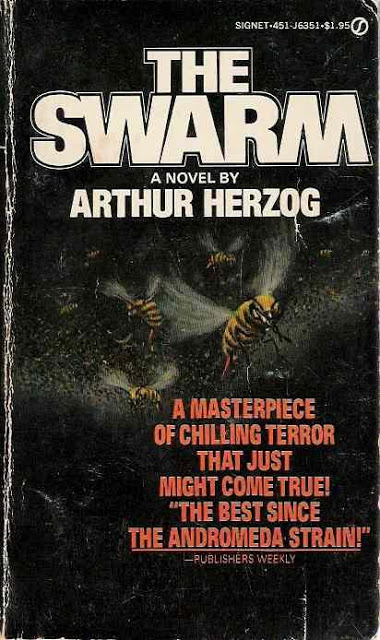Everyone has heard of killer bees – a mutant strain of honeybees known for their aggression, killing and attacking humans without provocation. This book, and the film it inspired, are part of the reason for that. In reality, although killer bees are aggressive, they kill only a few people a year.
In The Swarm, two people are dead by page 6. Not content with this initial assault, the bees embark on a campaign of aggression, culminating in their (successful) occupation and pacification of New York. And these aren’t even normal killer bees – they’re a mutation on top of a mutation, with all sorts of new deadly tricks.
This is a very strange book. It doesn’t really belong amongst all the other books where mutated monsters attack, because it’s not focused on the personal, or even really on the monster. This is a book about societal collapse, about humanity’s failures in the face of a threat that it doesn’t fully understand. As the bee menace grows, America falls apart, and a lot of that fall is entirely self-inflicted – people ignore sensible advice, choose the wrong hills to die on and then actually do. Not to be all current-events-y, but I found the human response to the external threat here a lot more well observed than I think I would have felt last year.
While there are central characters, it’s a stretch to call any of them a true protagonist; the viewpoint shifts around frequently, and is most commonly detached, with the tone of a historian. The most arguably-central of characters is a rather bland scientist who is not actually involved in much of the action, but who thinks a lot about it. Characterisation occurs, but lop-sidedly; there’s a romantic subplot, and various evolving interpersonal subplots, but the beats are in all the wrong places: the character side of things starts strong, gets dropped for a while, and then returns only to fizzle out well before the end.
Other than the giant bees attacking New York, this reads like non-fiction – the narration is dry, clinical, passionless. Bee behaviour is reported without any real attempt to draw out emotion from you, and the focus is on the mechanics of the invasion, not its consequences. This is the book I would expected to be reading if bees actually had attacked the USA.
The impression of non-fiction is strengthened by the diagrams and references scattered throughout. I was unable to locate the specific papers referred to, but I think that was a failure of search engines – for the few examples I tried, I found that those researchers did exist and were writing on the right topics at the right time. Herzog has clearly done a vast amount of research into bee biology and behaviour, and it’s often hard to distinguish exactly where the narrative shifts away from reality.
The plot moves in fits and starts, with moments of rapid progression interspersed with long, detailed descriptions of beekeeping processes or – in one extremely bizarre passage – the full narration of a minor character’s interaction with a computer. Every line of text displayed on his screen is reported as he muses about the correct inputs and slowly researches an unknown chemical; it might be the most tortuously stretched-out narration that I’ve ever read. When he finally finds a plot-relevant answer, he keeps it to himself and it isn’t mentioned again for a few chapters.
This book is of its time (1978), which means that it’s casually bigoted but wouldn’t think of itself as such. There’s a highly-qualified female character taking centre stage, but all the characters would rather leer than listen to her vital information. Men with high-pitched voices or shorter statures are shown to still have value, but their particular physical characteristics just keep on being mentioned negatively. There’s no outright xenophobia going on, but little touches of American exceptionalism shine through, along with fears of various shifty foreign powers.
Endearingly and accidentally, the book sounds far more racist than it actually is: killer bees are ‘Africanised’ honey bees (an actual real-world term), but Herzog often finds that too taxing to write. Instead, page after page is filled with comments about the dangers of the Africans swarming over here, taking over our fields and poisoning our women. I genuinely do think this is not intended to be a clunky metaphor: it’s not stark enough for how heavy-handed it would have to be. The actual main theme of the book is humanity’s relationship with nature, but if you picked a sentence at random you’d probably end up with a very different interpretation.
This was an odd read. I quite liked several things about its approach – the non-fiction trappings add an air of realism to a genre that often lacks it, and I’m always in favour of an author who is brimming with highly-specific minutiae. The decline of a country under an existential threat is well-observed. As a narrative though, and from an emotional impact point-of-view, the whole thing falls rather flat. It’s worth reading, I think, but I wouldn’t come back to it.

